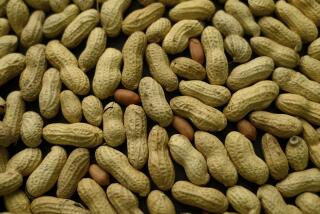For Some, Peanuts Are a Deadly Poison
- Share via
NEWARK, N.J. — Only a short time after he bit into a candy bar, German Lopez realized he was in danger. With his throat rapidly constricting, the high school senior rushed to the nurse’s office at John F. Kennedy High School in Paterson, N.J.
A few hours later, he was dead.
Family members believe Lopez, 18, died Nov. 7 of an allergic reaction to peanuts. They will not know for sure until a medical examiner’s report, expected later this year.
Allergic reactions to peanuts may kill as many as 100 people a year, according to Allan Bock, staff physician at the National Jewish Medical and Research Center in Boulder, Colo.
Although some people with peanut allergies may escape with just an itchy mouth, people with severe allergies may suffer hives, cramps, difficulty breathing, vomiting, diarrhea and anaphylaxis, which sends the body into shock, according to doctors studying the problem.
“It is probably one of the more severe, if not the most severe, food allergy reaction,” said Brett Kettelhut, chairman of a food allergy committee of the American Academy of Allergy, Asthma and Immunology. “It’s a lifelong food allergy . . . and there’s a great chance of accidental exposure if you’re not careful.”
*
In the past, when foods were simpler, it was easier to avoid peanuts, said Anne Munoz-Furlong, founder of the Food Allergy Network, which works to educate people about food allergies. Now peanuts turn up in unexpected places.
“We can eat them now for breakfast. We have them in snacks, in desserts, in sauces. We have heard of chefs crushing peanuts and putting them in the crusts of some cheesecakes to give them some texture,” she said.
Although it may take a substantial amount of peanuts to cause a reaction in someone with a mild allergy, a tiny amount could kill someone more sensitive to the food, Bock said.
Peanut-allergy sufferers have had violent reactions to food cooked in a pan that had been used earlier to cook peanuts, and to sandwiches made with a knife that had been used previously to spread peanut butter. One man died after eating an egg roll held together by a dollop of peanut butter.
“That story gets replayed over and over again. The people think they’re eating something that’s safe and they’re not,” Munoz-Furlong said.
Lopez had first suffered a severe reaction to peanuts when he was 5, said his aunt, Daisy Cuevas. Since then he avoided the food, Cuevas said. But he apparently was unaware there were peanuts in the candy bar he ate, she said.
“He was a severe asthmatic. We kind of knew that if he had something like that it could cause him to stop breathing or have a severe reaction like he did,” Cuevas said.
*
Lopez’s death fit the scenario for a death from a peanut allergy, said Hugh Sampson, professor of pediatrics at Johns Hopkins University.
“It’s someone who has asthma, who knows what the allergy is, who ingests [peanuts] unknowingly away from home--and for children that’s often at school--and there’s no immediate adrenaline available,” Sampson said.
People with a severe peanut allergy should always carry an epinephrine pen, Kettelhut said. If they suffer a reaction, they should immediately inject themselves with adrenaline from the pen and rush to an emergency room.
There are no thorough studies on how many suffer from allergies to peanuts, but Sampson believes the number is rising.
One theory for the increase is that children are eating peanuts at a much younger age, when they may develop a sensitivity to the food, Sampson said.
“It’s something that our society views as a good-tasting, nutritious food, and it’s introduced quite early,” he said.
More to Read
Eat your way across L.A.
Get our weekly Tasting Notes newsletter for reviews, news and more.
You may occasionally receive promotional content from the Los Angeles Times.









